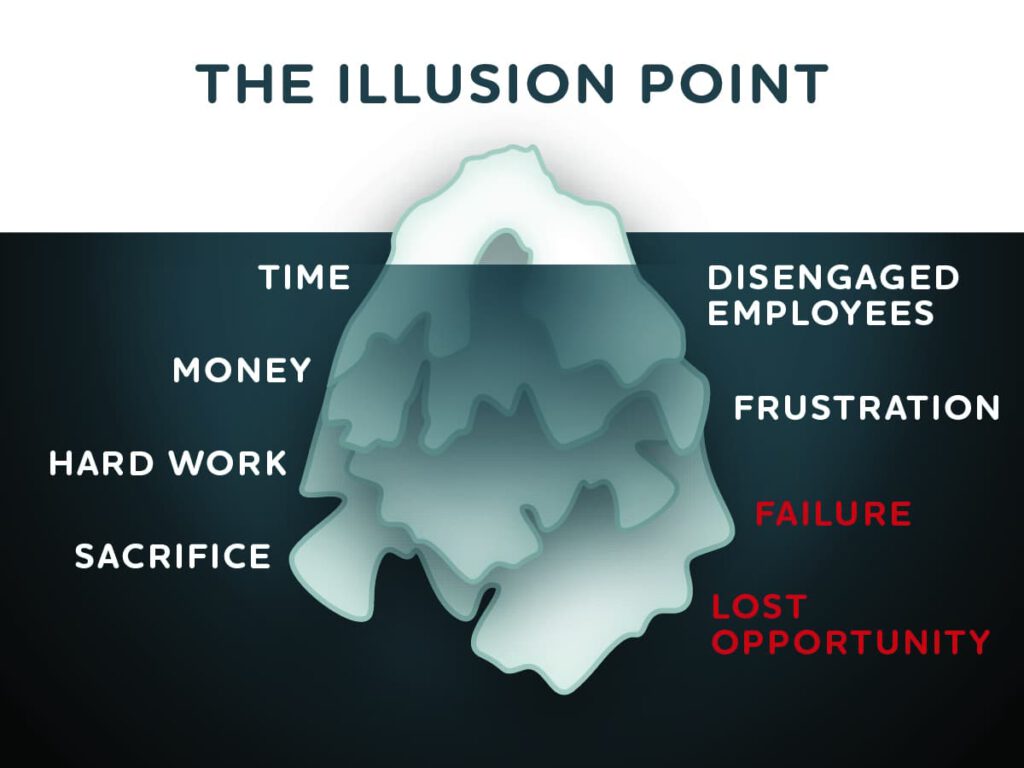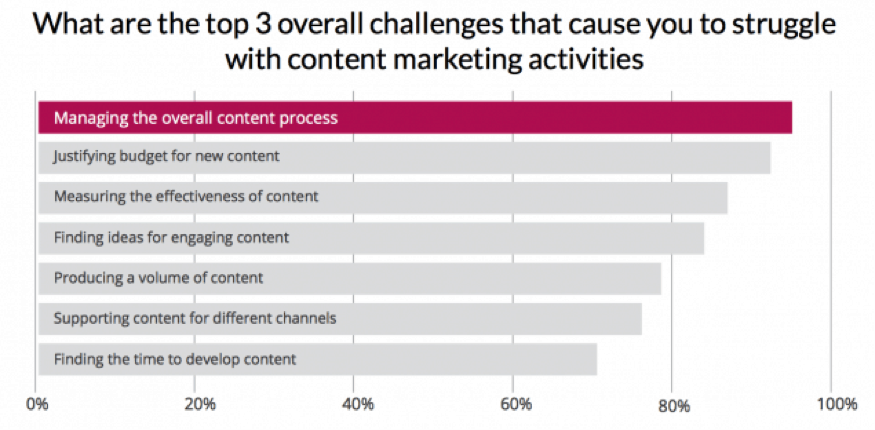In the first chapter of Mean People Suck, I discuss “The Illusion Point” – the concept that many people think they understand marketing and have great ideas, even when they’re going against the evidence provided by data.
This is especially true in the case of CEOs, who are used to being in charge and telling people what to do. Rising to the rank of CEO demands several years of experience, which means that some of these people have been in marketing a long time. Attaining the position of CEO requires excellent management skills and experience, but not all CEOs are as great as evolving their methods and thinking in such a fast-paced industry.
What this means is that some CEOs are firmly entrenched in the ideas of traditional marketing and can be resistant to change. Furthermore, their desire to direct everyone and be fully in control means that the marketers working under them can easily find themselves being instructed to do unproductive or even counterproductive tasks, wasting both time and money.
Quick Takeaways
- Companies are losing millions of dollars each year due to inefficiencies in content marketing.
- Poor management and communication introduce many of these inefficiencies.
- Whatever level you’re at in your career, you can use the power of empathy to build a better relationship with your boss and work together to achieve company goals.

We’ve all had the experience of being instructed to do something by our manager or CEO that we know isn’t the best use of our time at work.
This situation often happens when managers insist on directing the steps behind each goal instead of just the goal itself and leaving their employees to find the best path to that goal. This can be incredibly frustrating to employees who (rightly) feel that their ideas are not valued and they’re not trusted to do their jobs properly.
The Illusion point is not only damaging to manager-employee relationships but also wastes companies’ time and money.
In my book, I recall my own experience of this phenomenon at work, when our CEO instructed the marketing team to change the color of the packaging of a new product at the last minute, despite our research showing that another color would be more effective. We ended up losing tens of thousands of dollars and delaying the campaign for weeks, simply to please the CEO.
The Cost of Marketing Inefficiency
I was shocked, and yet at the same time not really surprised, when I found research by Kapost and Gleanster concluding that inefficiencies in content marketing cost B2B companies an estimated $958M each year.
This cost is attributed to companies spending a superfluous $120,000 a year on headcount compared to companies that have optimized their content operations. Additionally, these non-optimized companies have marketing cycle times that are 240% slower and produce 300% less content on average.
The companies surveyed overwhelmingly agreed that managing the overall content process was their biggest challenge.

A shocking 92% of companies also said that their main reason for missing content deadlines was approval delays, and 82% said poor communication between stakeholders was another major reason for delays.

To put it bluntly, bad management and poor communication at director level is the root cause of a lot of this inefficiency. While technology such as automation and a content marketing platform can certainly improve efficiency, it can’t overcome delays caused by bad decisions at C-suite level.
Overcoming The Illusion Point
The report referenced above backs up my own research into B2B companies I’d worked with personally. I discovered over half of the marketing campaigns run by these companies didn’t produce any kind of measurable business results.
So what can organizations do to overcome these inefficiencies caused by poor management?
The answer lies in the employees who are actually tasked with doing this inefficient work. In most cases, the marketers at ground level know that what they’ve been asked to do is ineffective and likely a waste of time.
The problem is that they’re too used to doing what their managers tell them to without questioning it.
We all want to please our bosses. We hope that this will lead to a good working relationship, recognition, and even perhaps a promotion or raise.
In reality, the work we do doesn’t get results, so we don’t get any thanks for it. All along we knew it wasn’t going to work, so we feel resentful, and the relationship between boss and employee breaks down even further.
The only way to break this cycle is to push back when you know the instructions you’re given from above are misguided.
This is easier said than done, of course. It takes a brave employee to stand up to a senior manager or CEO. But with a little empathy, it’s possible to find common ground and a solution that makes everyone happy.
Using Empathy to Reach Your Mean Boss
Do you have a mean boss who’s making your job and your life difficult? You may feel like throwing in the towel and getting a new job is the only way forward, but I’d like to suggest a different way.
Bosses are people, too. They all have their own pressures, most of which are invisible to their employees. They most likely have their own bosses, who are pushing them to achieve certain results. They’re probably struggling to juggle a high-pressure job with home life, just like you.
If you can step into your boss’s shoes for a moment and try to see the situation from their point of view, you can probably figure out a better way to communicate and work together. After all, you’re all working towards the same goal.
I discuss this in more detail in the book, of course! The fact that so many companies are suffering from inefficiencies caused by poor working relationships and a lack of empathy was one of the major reasons I decided to write it in the first place. I know that if more of us can understand the power of empathy, we’ll enjoy better careers, build more successful companies, and live more fulfilling lives.
So what do you think? Please consider picking up your copy of Mean People Suck today, and get the bonus visual companion guide as well. Or check out our services to help evolve your culture. And I would be thrilled to come present to your team on the power of empathy!


H1lAxC85xIp
aO0FRtJzoIT
akyCr2bFHdF
QiRXqXhzlFe
r0CRQgrGbbZ
fDMZhmVTjEo
407adtJA8Ij
r95fJcQEZE7
C4D27x5L3V4
rNlRipPXNZk
cV0ygxh1P4Z
HDqBxIy1Kv9
H4kZLA2xHCm
x54XTsH1Jo0
yaRlHLFjb8f
IhPj5MgGJdj
udVI4gEwjvS
ijrkE7K1dyi
yzb1S9KtwWW
8ZosBEFg71C
nm9IvSKiHg8
paKoqffBDWH
AwpMV2yQI60
apJrMVdWFSU
dYIo4sPEVmW
4inW5Kw0EWq
YLVI65fn3ww
oEra8mgp7QI
ZuiotJ49foQ
5T6mySevp3N
uILHhfuSmz6
9F4eSJxqjvp
nlPKfzWQqwi
chLpkTp33nX
pUegNyOkW5C
F4llc7lJO6i
Thanks for sharing. I read many of your blog posts, cool, your blog is very good.
Can you be more specific about the content of your article? After reading it, I still have some doubts. Hope you can help me.
Your article helped me a lot, is there any more related content? Thanks!
Medscape Drugs & Diseases.
can i get lisinopril prices
Always ahead of the curve with global healthcare trends.
They have a fantastic range of supplements.
where to buy cheap clomid price
They provide access to global brands that are hard to find locally.
Setting global standards in pharmaceutical care.
how can i get cytotec without dr prescription
Their home delivery service is top-notch.
Their senior citizen discounts are much appreciated.
gabapentin phenibut combo
Their worldwide pharmacists’ consultations are invaluable.
Their health seminars are always enlightening.
buy cipro price
Their global pharmacists’ network is commendable.
Your point of view caught my eye and was very interesting. Thanks. I have a question for you. https://accounts.binance.com/en/register-person?ref=JHQQKNKN
Your point of view caught my eye and was very interesting. Thanks. I have a question for you.
A code promo 1xBet est un moyen populaire pour les parieurs d’obtenir des bonus exclusifs sur la plateforme de paris en ligne 1xBet. Ces codes promotionnels offrent divers avantages tels que des bonus de dépôt, des paris gratuits, et des réductions spéciales pour les nouveaux joueurs ainsi que les utilisateurs réguliers.code promo 1xbet aujourd’hui
Can you be more specific about the content of your article? After reading it, I still have some doubts. Hope you can help me.
Get ready to elevate your betting experience with an exclusive 1xBet promo code! Whether you’re from Bangladesh, Pakistan, India, Nepal, Sri Lanka, Nigeria, Egypt, or the Philippines, you can unlock amazing rewards like free bets, no deposit bonuses, and free spins using the latest 1xBet promo codes today. New users can enjoy a special registration promo code that boosts your first deposit or even gives you a chance to play risk-free. Looking for a Bangladesh 1xBet promo code or a 1xBet promo code India for the app? We’ve got it all here, updated daily. Don’t miss your chance to grab a 1xBet official promo code, win big, and make the most out of your betting journey. Claim your 1xBet free promo code today and start winning smarter with bigger bonuses, free spins, and more exclusive offers worldwide! No matter where you are, finding the right 1xBet promo code today means unlocking bigger chances to win, with offers perfectly tailored for players across Bangladesh, Pakistan, India, Nepal, Sri Lanka, Nigeria, Egypt, and the Philippines.
mOBL GLGLcm ECOz XxhBREC
I don’t think the title of your article matches the content lol. Just kidding, mainly because I had some doubts after reading the article.
I don’t think the title of your article matches the content lol. Just kidding, mainly because I had some doubts after reading the article.
Excellent article! You’ve done a fantastic job of breaking down a complicated subject into manageable parts. The structure is logical, and the language is clear, which makes the content accessible to many readers. Looking forward to reading more insightful posts from you.